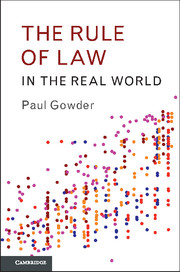Book contents
- The Rule of Law in the Real World
- The Rule of Law in the Real World
- Copyright page
- Dedication
- Contents
- Acknowledgments
- Introduction
- Chapter 1 The rule of law: a basic account
- Chapter 2 The strong version of the rule of law
- Chapter 3 Generality and hierarchy
- Chapter 4 Egalitarian liberty and reciprocity in strategic context
- Chapter 5 Isonomia: The dawn of legal equality
- Chapter 6 The logic of coordination
- Chapter 7 Parliament, Crown, and the rule of law in Britain
- Chapter 8 The logic of commitment
- Chapter 9 The role of development professionals: measurement and promotion
- Conclusion
- Notes
- References
- Index
3 - Generality and hierarchy
Published online by Cambridge University Press: 05 February 2016
- The Rule of Law in the Real World
- The Rule of Law in the Real World
- Copyright page
- Dedication
- Contents
- Acknowledgments
- Introduction
- Chapter 1 The rule of law: a basic account
- Chapter 2 The strong version of the rule of law
- Chapter 3 Generality and hierarchy
- Chapter 4 Egalitarian liberty and reciprocity in strategic context
- Chapter 5 Isonomia: The dawn of legal equality
- Chapter 6 The logic of coordination
- Chapter 7 Parliament, Crown, and the rule of law in Britain
- Chapter 8 The logic of commitment
- Chapter 9 The role of development professionals: measurement and promotion
- Conclusion
- Notes
- References
- Index
Summary
In this chapter, I will use the conception of generality from the previous chapter to make sense of the way that the rule of law helps us understand hierarchical subordination in the real world. As will be seen, the principle of generality makes demands not only of legal systems, but of the entire basic structure of a state that organizes itself through law. Establishing true legal equality is not easy, but it turns out to be of more than merely formal value.
The literacy tests: a model of nongeneral law
I will flesh out the demands of the principle of generality through an examination of the Jim Crow literacy tests that were used to exclude African Americans from the ballot box. For analytic purposes, we may assume, counterfactually, that they were evenhandedly implemented across races. Nonetheless, I claim that the public reason conception of generality would have condemned even fairly administered literacy tests in the social context of the Jim Crow South.
Begin with some intuition. As we today interpret our history, the literacy tests could only be understood as insults to the freed slaves and their descendants, whose equal citizenship had supposedly been acknowledged by the Reconstruction amendments. By making this acknowledgment into a lie, the literacy tests implied that no matter what the Constitution said, they would never be full members of the political community.
Because the enactment of the literacy tests unavoidably carried that message, the distinctions they drew between the literate and the illiterate were unjustifiable by public reasons. Consequently, the laws were not general.
Thus, at least, is the intuition. Someone might object and deny that the literacy tests carried any such message. While unfortunate, our objector might suggest that the literacy tests just so happened to pick out freed slaves for disenfranchisement; they need not carry any social meaning about their less than full citizenship.
Further pressing this objection, one might point out that we could imagine all kinds of benign literacy tests. Were a public reason available for the literacy tests from each of the first-, second-, and third-person standpoints, then they would not have unavoidably carried the inegalitarian expressive content.
Indeed, in the abstract, there are many plausible arguments that lead to the conclusion that one ought to have literacy tests for the exercise of the franchise.
Information
- Type
- Chapter
- Information
- The Rule of Law in the Real World , pp. 42 - 57Publisher: Cambridge University PressPrint publication year: 2016
- Creative Commons
- This content is Open Access and distributed under the terms of the Creative Commons Attribution licence CC-BY-NC-ND 4.0 https://creativecommons.org/cclicenses/
